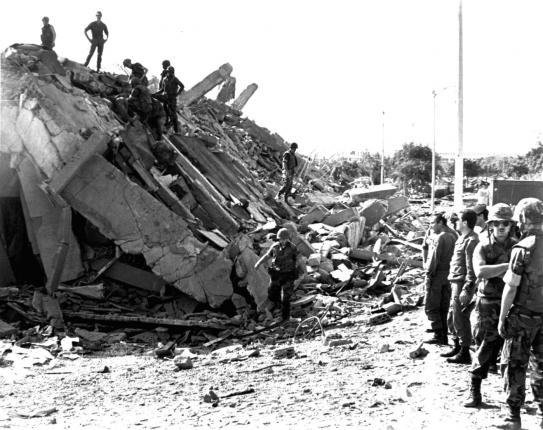1 of 3 | Service members pick through the rubble following the bombing of the USMC barracks in Beirut, Lebanon on Oct. 23, 1983. The terror attack resulted in the deaths of 220 Marines. File Photo by USMC/UPI
BEIRUT, Lebanon, Oct. 28, 1983 (UPI) - One week after the bombing that took the lives of more than 200 American servicemen, the Marine bastion at Beirut airport is getting the kind of defenses that might have prevented the suicide attack.
Buses and trucks are close-parked at the entrance, and mounds of earth have been thrown up at vulnerable points.
The Marines are being a lot more secretive about their dispositions, and a number of other unspecified precautions have been taken, according to the Marine commander, Col. Timothy Geraghty.
Why couldn't such precautions have been taken earlier?
The answer lies in the nature of the mission of the four-nation peace-keeping force.
''We are not here on a combat mission,'' said Geraghty. ''Our deployments are not tactical. The information the killer had about us was readily available simply because of our location.''
As peacekeepers, do the Marines have to be visible to be effective?
''That's correct,'' said Geraghty. ''Along with other members of the Multinational Force we have been quite visible here during the past year.
''We have run literally thousands of patrols on a routine basis seven days a week. The acceptance by the people of our role to provide stability for the government of Lebanon is well known.'
French commander Gen. Francois Cann, who mourned the loss of 56 of his men after a parallel attack, conceded that security outside his headquarters had not been ironclad.
There was a roadblock, but otherwise traffic could circulate along the street running beside the destroyed French headquarters.
''Our mission here is to help the civilian population and protect peace,'' Cann said. ''If we had cut the road, then we would have cut off the life of the community, cut off the population and undermined our whole reason for being here.''
The Italian and British peacekeeping contingents also are mingled with the population. Their security was not noticeably better. Perhaps they were spared only because the hands that guided the bombers had no particular political quarrel with their governments' policies.
If there is truth to the theory that the bombing was the work of Shiite Moslem fundamentalists inspired by Syria or Iran, it might explain why only the Marines and the French were the targets on that black Sunday.
The Shiites oppose and mistrust America's Middle East policies. France had given offense by supplying Super Etendard bombers and Exocet missiles to Iraq, the enemy of Iran and thus of the Shiites who look to the Ayatollah Khomeini for spiritual guidance.
In hindsight, the Marines ignored or discounted a number of warning factors that might have led them to intensify security at their base, but apparently did not.
Following the bombing of the U.S. Embassy with the loss of 63 lives April 18, the Americans had evidence that they had enemies in Lebanon who were ruthless, efficient, fanatical and shady.
Having been in Lebanon without major incident for a whole year, the Marines themselves started coming under fire two months ago -- from Druze and Shiite militiamen, and perhaps also from outside provocateurs.
Earlier this month, the Marines started taking fire from surrounding Shiite neighborhoods, and Geraghty said he had ''clear indication that there were new elements in town that were specifically targeting Marines.''
Finally, the Americans had received ''a lot'' of warnings about car bomb attacks, Geraghty said, and four Marines were injured by a booby-trapped car only four days before the attack on their headquarters.
Despite the embassy bombing, the Marine headquarters at Beirut airport was not protected against a similar kamikaze attack.
There were no ditches, tank traps or other heavy objects that would have stopped a big truck coming through at speed. When the disaster occurred, a sentry at the perimeter fence had no ammunition in his rifle.
Sentries had become so used to seeing airport trucks and other civilian vehicles on the parking lot that they perhaps paid little attention when the yellow Mercedes, packed with a ton of explosives, started to pick up speed.
''It was a very well-planned, well-coordinated operation,'' Geraghty said. ''Obviously they had made a reconnaissance of our area.''















